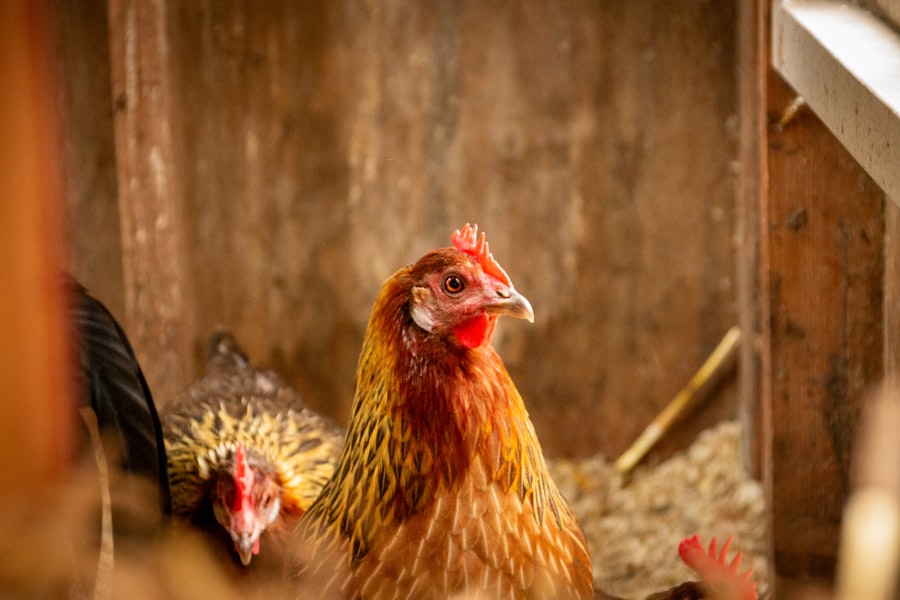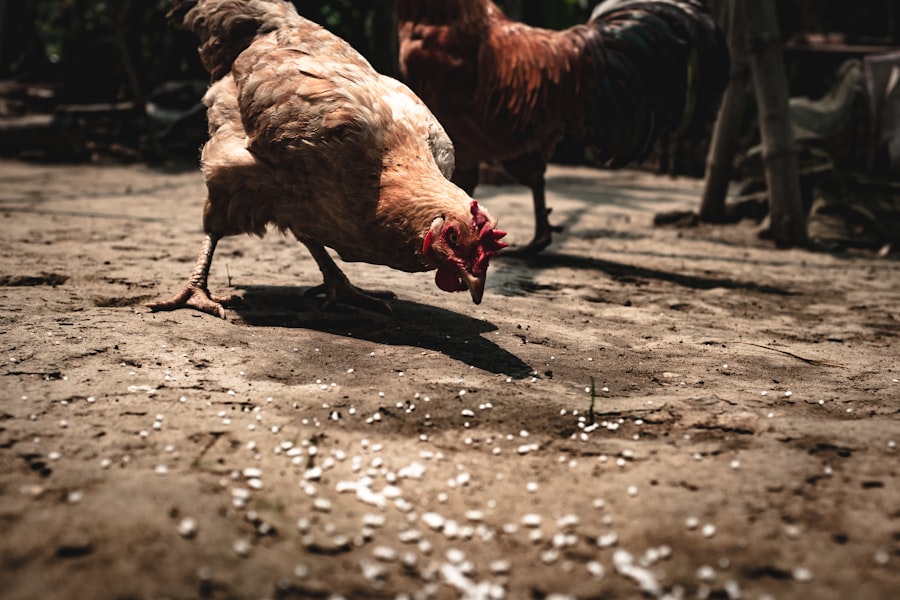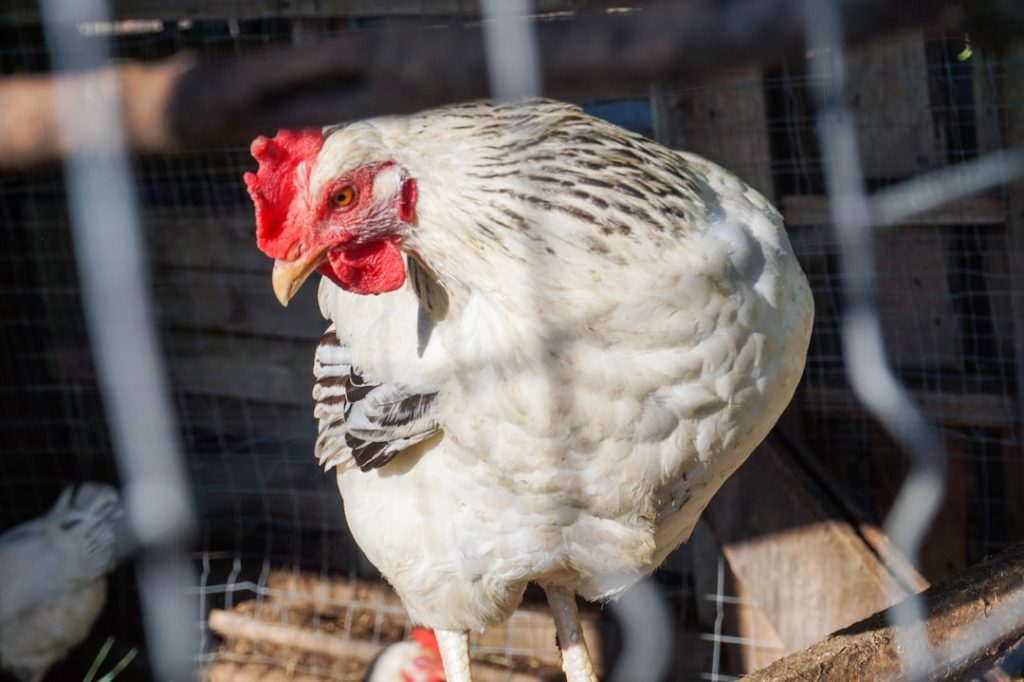Proper housing for chickens is essential for their health, well-being, and productivity. Chickens require a safe and secure environment that protects them from predators, extreme weather conditions, and other potential dangers. A well-designed chicken coop provides a comfortable space for chickens to roost, lay eggs, and engage in natural behaviors such as scratching and dust bathing.
Adequate housing also helps maintain good hygiene and sanitation, reducing the risk of disease and promoting overall flock health. Proper housing plays a crucial role in the overall management of chickens. It allows for easy access to the birds for feeding, watering, and health checks, as well as providing a controlled environment for monitoring egg production and collecting eggs.
A well-designed chicken coop also helps manage waste and odors, minimizing environmental impact and ensuring a clean and pleasant living space for both the chickens and their caretakers. In summary, proper housing is essential for the physical and psychological well-being of chickens, as well as for efficient flock management.
Table of Contents
- 1 Factors to Consider When Keeping Chickens in a Box
- 2 Recommended Time Limits for Keeping Chickens in a Box
- 3 Potential Risks and Health Concerns for Chickens in a Box
- 4 Alternatives to Keeping Chickens in a Box
- 5 Tips for Creating a Temporary Housing Solution for Chickens
- 6 Understanding the Legal and Ethical Considerations of Keeping Chickens in a Box
- 7 FAQs
Key Takeaways
- Proper housing for chickens is crucial for their health and well-being
- Factors to consider when keeping chickens in a box include space, ventilation, and cleanliness
- Recommended time limits for keeping chickens in a box should be limited to temporary situations
- Potential risks and health concerns for chickens in a box include stress, disease, and injury
- Alternatives to keeping chickens in a box include free-range, mobile coops, and chicken tractors
- Tips for creating a temporary housing solution for chickens include providing adequate space and access to food and water
- Understanding the legal and ethical considerations of keeping chickens in a box is important to ensure compliance with regulations and animal welfare standards
Factors to Consider When Keeping Chickens in a Box
Size Matters
The size of the box or enclosure must be adequate to accommodate the number of chickens being housed. Overcrowding can lead to stress, aggression, and poor hygiene, so it’s crucial to provide enough space for the birds to move around comfortably and engage in natural behaviors.
Ventilation and Air Quality
Proper ventilation is essential for maintaining good air quality and preventing the buildup of harmful gases such as ammonia. Adequate ventilation also helps to regulate temperature and humidity levels, creating a more comfortable environment for the chickens.
Additional Considerations
It’s also important to provide access to natural light, which helps to regulate the birds’ circadian rhythms and supports overall health and productivity. The flooring of the box or enclosure should be easy to clean and provide good traction for the chickens to prevent injuries. Providing appropriate bedding or litter material can help to absorb moisture, control odors, and provide a comfortable surface for the birds to rest on. Finally, access to food and water is essential, so the box should be designed to accommodate feeders and waterers that are easily accessible to the chickens while also preventing contamination.
Recommended Time Limits for Keeping Chickens in a Box

While temporary housing solutions can be useful in certain situations, it’s important to limit the amount of time that chickens are kept in a box or enclosure. Ideally, chickens should have access to outdoor space where they can engage in natural behaviors such as foraging, dust bathing, and sunbathing. If outdoor access is not possible, chickens should be provided with regular opportunities for supervised free-ranging or access to a larger enclosed run.
In general, it’s recommended that chickens are not kept in a box or enclosure for extended periods of time. If outdoor access is limited, chickens should be allowed out of the box for at least a few hours each day to stretch their legs and engage in natural behaviors. Additionally, regular rotation of the box or enclosure to fresh ground can help to prevent the buildup of waste and maintain good hygiene.
It’s important to monitor the behavior and well-being of the chickens when they are kept in a box and make adjustments as needed. Signs of stress or boredom, such as feather picking or aggressive behavior, may indicate that the birds need more space or enrichment. Ultimately, the goal should be to provide chickens with as much outdoor access as possible while still ensuring their safety and well-being.
Potential Risks and Health Concerns for Chickens in a Box
Keeping chickens in a box or temporary housing solution can pose several potential risks and health concerns if not managed properly. One of the primary risks is overcrowding, which can lead to stress, aggression, and poor hygiene. Overcrowded conditions can also increase the risk of disease transmission and compromise overall flock health.
Additionally, inadequate ventilation and poor air quality in the box can lead to respiratory issues and other health problems for the chickens. Another potential risk is the buildup of waste and ammonia in the box, which can create an unsanitary environment and lead to respiratory issues and skin irritation for the birds. Inadequate access to natural light and outdoor space can also have negative impacts on the chickens’ physical and psychological well-being, leading to issues such as vitamin D deficiency and behavioral problems.
Furthermore, keeping chickens in a box without proper predator protection can put the birds at risk of attack. Predators such as raccoons, foxes, and birds of prey can pose a serious threat to confined chickens if the box is not secure. Finally, inadequate access to food and water can lead to malnutrition and dehydration, compromising the health and productivity of the birds.
Alternatives to Keeping Chickens in a Box
While keeping chickens in a box may be necessary in certain situations, there are several alternatives that can provide a more suitable living environment for the birds. One option is to provide a larger enclosed run or outdoor space where the chickens can roam freely while still being protected from predators. This allows the birds to engage in natural behaviors such as foraging, dust bathing, and sunbathing while also providing access to fresh air and natural light.
Another alternative is to use portable chicken tractors or mobile coops that can be moved to fresh ground regularly. This allows chickens to have access to fresh forage while still being protected from predators and adverse weather conditions. Portable coops also help to manage waste more effectively by allowing it to be spread over a larger area.
For those with limited outdoor space, providing supervised free-ranging opportunities can also be beneficial. Allowing chickens to roam freely under supervision allows them to engage in natural behaviors while still being protected from predators and other dangers. Ultimately, providing outdoor access is essential for the health and well-being of chickens, so it’s important to explore alternative housing options that allow for outdoor enrichment while still ensuring the safety of the birds.
Tips for Creating a Temporary Housing Solution for Chickens

Space and Comfort
The box or enclosure should provide adequate space for the number of chickens being housed, allowing them to move around comfortably and engage in natural behaviors such as scratching and perching.
Ventilation and Air Quality
Proper ventilation is crucial for maintaining good air quality and preventing the buildup of harmful gases like ammonia. This can be achieved by incorporating windows or vents into the design of the box or enclosure.
Lighting, Flooring, and Essentials
Access to natural light is essential for regulating the birds’ circadian rhythms and supporting overall health and productivity. If natural light is limited, supplemental lighting can be used. The flooring should be easy to clean and provide good traction for the chickens, with appropriate bedding or litter material to absorb moisture, control odors, and provide a comfortable surface. Finally, the box or enclosure should be designed with accommodations for easily accessible feeders and waterers, while preventing contamination.
Understanding the Legal and Ethical Considerations of Keeping Chickens in a Box
When considering keeping chickens in a box or temporary housing solution, it’s important to understand the legal and ethical considerations involved. In many areas, there are regulations governing the housing and care of poultry that must be adhered to. These regulations may include requirements for minimum space allowances per bird, ventilation standards, predator protection measures, and waste management protocols.
It’s important to research local laws and regulations regarding poultry housing before implementing a temporary housing solution for chickens. Failure to comply with these regulations can result in fines or other legal consequences. In addition to legal considerations, it’s important to consider the ethical implications of keeping chickens in a box.
While temporary housing solutions may be necessary in certain situations, it’s essential to prioritize the well-being of the birds by providing adequate space, ventilation, access to natural light, and opportunities for outdoor enrichment. Ultimately, understanding and adhering to legal and ethical considerations is essential for responsible poultry management when implementing temporary housing solutions for chickens. By prioritizing the health and well-being of the birds while also complying with legal requirements, caretakers can ensure that their chickens are provided with a safe and comfortable living environment.
If you’re interested in learning more about how to properly care for chickens, you may want to check out this article on farmhouse chicken coop. It provides valuable information on creating a suitable living environment for your chickens, which is essential for their health and well-being.
FAQs
What is the maximum amount of time you can keep chickens in a box?
Chickens should not be kept in a box for more than a few hours at a time. It is important to provide them with adequate space, food, water, and ventilation.
What are the potential risks of keeping chickens in a box for too long?
Keeping chickens in a box for an extended period of time can lead to stress, discomfort, and health issues. They may also exhibit aggressive behavior and pecking due to the confined space.
What should be considered when temporarily keeping chickens in a box?
If you need to temporarily keep chickens in a box, ensure that the box is spacious enough for them to move around, has proper ventilation, and is equipped with food and water. It is also important to monitor their behavior and well-being.
How can chickens be safely transported in a box?
When transporting chickens in a box, make sure the box is well-ventilated, secure, and provides enough space for the chickens to stand and move around. Avoid overcrowding and provide a comfortable bedding material. Additionally, minimize sudden movements and keep the box in a stable position during transportation.
Meet Walter, the feathered-friend fanatic of Florida! Nestled in the sunshine state, Walter struts through life with his feathered companions, clucking his way to happiness. With a coop that’s fancier than a five-star hotel, he’s the Don Juan of the chicken world. When he’s not teaching his hens to do the cha-cha, you’ll find him in a heated debate with his prized rooster, Sir Clucks-a-Lot. Walter’s poultry passion is no yolk; he’s the sunny-side-up guy you never knew you needed in your flock of friends!







